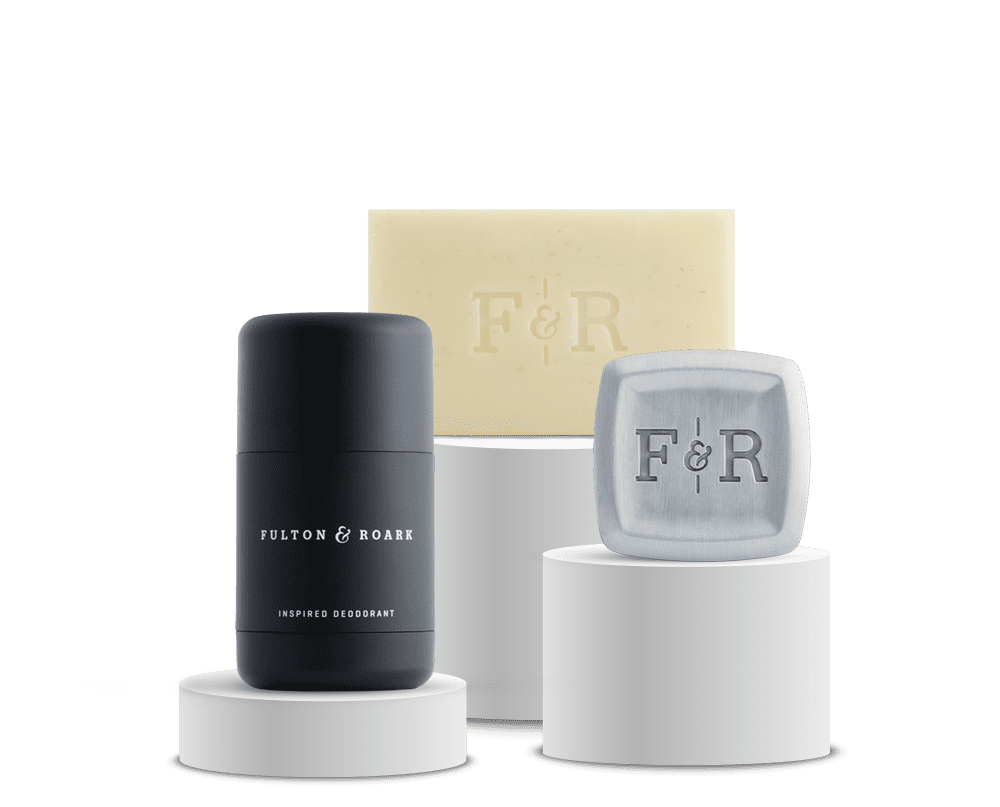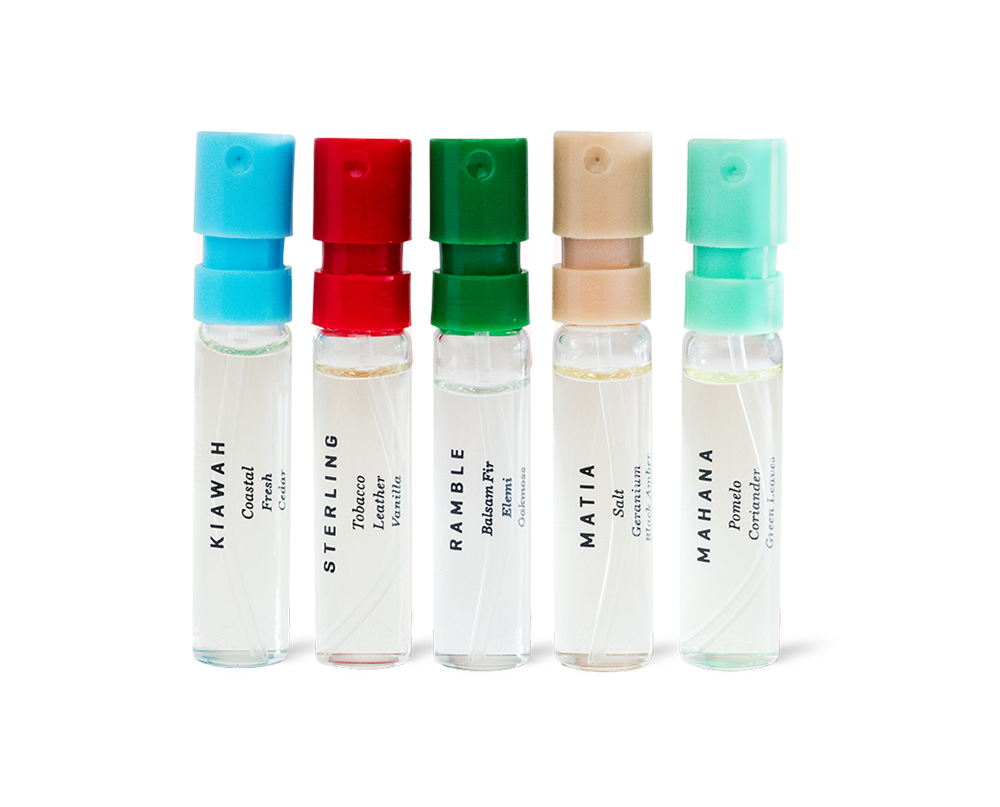Shipping:
$3.00 USD
Total
$0.00 USD


 Shop all our fine fragrances
Shop all our fine fragrances
 Salt, Geranium, and Black Amber
Salt, Geranium, and Black Amber
 Brazilian Pepper, Cedarwood, Magnolia
Brazilian Pepper, Cedarwood, Magnolia
 Pomelo, Coriander, Green Leaves
Pomelo, Coriander, Green Leaves
 Sandalwood, Sage, Amber
Sandalwood, Sage, Amber
 Coastal, Fresh, Cedar
Coastal, Fresh, Cedar
 Tobacco, Leather, Vanilla
Tobacco, Leather, Vanilla
 Atlas Cedar, Neroli, Amber
Atlas Cedar, Neroli, Amber
 5-in-1 fine fragrance oil
5-in-1 fine fragrance oil
 Highly-effective, fine fragrance, aluminum-free deodorant
Highly-effective, fine fragrance, aluminum-free deodorant
 Long-lasting, lightly-exfoliating, fine fragrance
Long-lasting, lightly-exfoliating, fine fragrance
 Sets with our Permanent Collection fragranced products
Sets with our Permanent Collection fragranced products
 Rosewood, Ginger, Bergamot
Rosewood, Ginger, Bergamot
 Highly-concentrated, wax-based, fine fragrances
Highly-concentrated, wax-based, fine fragrances
 Solid Fragrance and Deodorant Refills available
Solid Fragrance and Deodorant Refills available
 Forest Air, Lavender, Lemon Rind
Forest Air, Lavender, Lemon Rind
 Incense, Vetiver, Cardamom
Incense, Vetiver, Cardamom
 Virginia Cedar, Clary Sage
Virginia Cedar, Clary Sage
 Rum, Tobacco, Sandalwood
Rum, Tobacco, Sandalwood
 "Virtual Paper"
"Virtual Paper"
 Curated Collection of Fragrance Samples
Curated Collection of Fragrance Samples
 Desert Wind, Freesia, Myrrh
Desert Wind, Freesia, Myrrh
 Fresh Rain, Cashmere
Fresh Rain, Cashmere
 Tuberose, Petitgrain, Patchouli
Tuberose, Petitgrain, Patchouli
 Oak, Cloudberry, Tree Moss
Oak, Cloudberry, Tree Moss
 Highly-concentrated spray fragrance
Highly-concentrated spray fragrance
 Orange Bitters, Tonic
Orange Bitters, Tonic
 Sea Spray, Juniper, Cypress
Sea Spray, Juniper, Cypress
 Lavandin, Gravel Ghost, Ironwood
Lavandin, Gravel Ghost, Ironwood
 Amber, Guaiacwood, Osmanthus
Amber, Guaiacwood, Osmanthus
 A collection inspired by the rhythm, energy, and elegance of urban life.
A collection inspired by the rhythm, energy, and elegance of urban life.
 Scents that echo the stark beauty of the vast and arid landscapes.
Scents that echo the stark beauty of the vast and arid landscapes.
 Inspired by salt air, ocean breeze, and sunlit shores.
Inspired by salt air, ocean breeze, and sunlit shores.
 Ocotillo, Orris, Desert Rain
Ocotillo, Orris, Desert Rain
 Scents that feel like a walk through green, shaded trails.
Scents that feel like a walk through green, shaded trails.
 Inspired by fresh air, tall trees, and peaceful views.
Inspired by fresh air, tall trees, and peaceful views.








 Ruby Grapefruit, Rhubarb, Violet
Ruby Grapefruit, Rhubarb, Violet
 Bluebonnet, Fresh Raspberry, Black Jack
Bluebonnet, Fresh Raspberry, Black Jack
 Shop all our fine fragrances
Shop all our fine fragrances
 Salt, Geranium, and Black Amber
Salt, Geranium, and Black Amber
 Brazilian Pepper, Cedarwood, Magnolia
Brazilian Pepper, Cedarwood, Magnolia
 Pomelo, Coriander, Green Leaves
Pomelo, Coriander, Green Leaves
 Sandalwood, Sage, Amber
Sandalwood, Sage, Amber
 Coastal, Fresh, Cedar
Coastal, Fresh, Cedar
 Tobacco, Leather, Vanilla
Tobacco, Leather, Vanilla
 Atlas Cedar, Neroli, Amber
Atlas Cedar, Neroli, Amber
 5-in-1 fine fragrance oil
5-in-1 fine fragrance oil
 Highly-effective, fine fragrance, aluminum-free deodorant
Highly-effective, fine fragrance, aluminum-free deodorant
 Long-lasting, lightly-exfoliating, fine fragrance
Long-lasting, lightly-exfoliating, fine fragrance
 Sets with our Permanent Collection fragranced products
Sets with our Permanent Collection fragranced products
 Rosewood, Ginger, Bergamot
Rosewood, Ginger, Bergamot
 Highly-concentrated, wax-based, fine fragrances
Highly-concentrated, wax-based, fine fragrances
 Solid Fragrance and Deodorant Refills available
Solid Fragrance and Deodorant Refills available
 Forest Air, Lavender, Lemon Rind
Forest Air, Lavender, Lemon Rind
 Incense, Vetiver, Cardamom
Incense, Vetiver, Cardamom
 Virginia Cedar, Clary Sage
Virginia Cedar, Clary Sage
 Rum, Tobacco, Sandalwood
Rum, Tobacco, Sandalwood
 "Virtual Paper"
"Virtual Paper"
 Curated Collection of Fragrance Samples
Curated Collection of Fragrance Samples
 Desert Wind, Freesia, Myrrh
Desert Wind, Freesia, Myrrh
 Fresh Rain, Cashmere
Fresh Rain, Cashmere
 Tuberose, Petitgrain, Patchouli
Tuberose, Petitgrain, Patchouli
 Oak, Cloudberry, Tree Moss
Oak, Cloudberry, Tree Moss
 Highly-concentrated spray fragrance
Highly-concentrated spray fragrance
 Orange Bitters, Tonic
Orange Bitters, Tonic
 Sea Spray, Juniper, Cypress
Sea Spray, Juniper, Cypress
 Lavandin, Gravel Ghost, Ironwood
Lavandin, Gravel Ghost, Ironwood
 Amber, Guaiacwood, Osmanthus
Amber, Guaiacwood, Osmanthus
 A collection inspired by the rhythm, energy, and elegance of urban life.
A collection inspired by the rhythm, energy, and elegance of urban life.
 Scents that echo the stark beauty of the vast and arid landscapes.
Scents that echo the stark beauty of the vast and arid landscapes.
 Inspired by salt air, ocean breeze, and sunlit shores.
Inspired by salt air, ocean breeze, and sunlit shores.
 Ocotillo, Orris, Desert Rain
Ocotillo, Orris, Desert Rain
 Scents that feel like a walk through green, shaded trails.
Scents that feel like a walk through green, shaded trails.
 Inspired by fresh air, tall trees, and peaceful views.
Inspired by fresh air, tall trees, and peaceful views.








 Ruby Grapefruit, Rhubarb, Violet
Ruby Grapefruit, Rhubarb, Violet
 Bluebonnet, Fresh Raspberry, Black Jack
Bluebonnet, Fresh Raspberry, Black Jack
For proper context, it is helps to start with the three basic reasons that cause us to sweat. The first is to cool us down when the temperature of wherever we are is hot. The second reason is that the body responds to physical exertion from exercise and begins sweating to cool us down. The third is different from the other two and is triggered when the body gets stress signals, such as an intense meeting at work, or when you get a text from your significant other that reads, "we need to talk."
For the first two reasons you sweat (heat and exercise), your body’s eccrine glands kick in. Eccrine glands are located virtually all over your skin, and they typically release a mixture of water and salts (like sodium and potassium…the same electrolytes you want to replenish after a workout)
However, when you’re stressed, your apocrine glands kick in. Apocrine glands are more highly concentrated on the parts of your body that naturally have hair, such as your armpits and around your genitals. The sweat released from your apocrine glands is also initially odorless. Unlike sweat from your eccrine glands, apocrine sweat also contains lipids and proteins, which are great food for the bacteria that is present on your body. So, most of the “b.o. smell” that people associate with sweat is not coming directly from one’s sweat, but rather from the bacteria feeding on their sweat.
There are really two ways to combat odor. One is to prevent sweat from accumulating at all, at the other is to make your body less hospitable to the bacteria that cause unpleasant odors.
Aluminum antiperspirants block your body’s sweat glands, which keep them from producing sweat. Less sweat, means drier body hair and skin, less ability for bacteria to grow, and ultimately less odor.
Deodorants can work in a number of ways, including the use of salts and minerals, which can make your skin and hair less friendly to the smelly bacteria. Additionally, plant enzymes, such as aloe vera have antimicrobial properties which also prevent the growth of bacteria. Deodorants may also contain absorptive ingredients that help prevent wetness. And finally, most deodorants also include additional fragrance which is designed to not only keep one from smelling bad, but even helping to make one smell good.
Many people have begun to switch from antiperspirants to aluminum-free deodorants, citing health concerns. While some people experience allergies or irritation as the result of aluminum in antiperspirants, there is no conclusive evidence that antiperspirant is harmful to your long-term.
Even so, there may be other benefits to switching to aluminum-free deodorant. Antiperspirants can cause staining with some fabrics. Additionally, sweating is a natural part of what your body does. So long as you smell good, why work to stop it?
If you’re making the switch from an aluminum antiperspirant to a natural deodorant, be patient. As your pores begin to reopen (after being stopped up for years in many people’s cases) you might notice that you need to reapply once or twice per day as your body starts to adjust. After a couple of weeks, your body’s sweat glands and biome should find its new normal, and you’ll likely be happy with the change!
Whether you're wearing an antiperspirant or aluminum-free deodorant, odds are that it is heavily scented. For some, that's a great thing. But, if you have gone to the effort and expense of buying and wearing a cologne or perfume you really like, don't let the experience get muddled and ruined by wearing a clashing scent from your deodorant. Because we believe fine fragrance is such an important part of feeling your best, we created our line of deodorants in scents that match back to our best-selling solid fine fragrances. Want to learn more? Check them out here.
--
Get free US shipping on orders $50+
Get free US shipping on orders $50+
Get free US shipping on orders $50+
Get free US shipping on orders $50+
It looks like you have wholesale items in your cart. If you are not an F&R retail partner and would like to add a regular item to your cart, please remove the wholesale items first.
If you are an F&R retail partner and mistakenly landed in our e-commerce store, please switch to our Wholesale Portal to continue shopping.
It looks like you have regular items in your cart and are attempting to add a wholesale item. If you are an F&R retail partner, please remove any regular items first before adding wholesale items to your cart.
Shipping:
$3.00 USD
Total
$0.00 USD